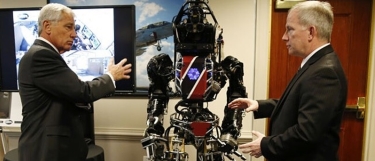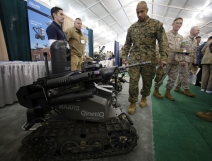
What can memorise things, can smile and feel happiness and sadness?
The answer to this question is no longer just man following a recent innovation made by scientists in Singapore.
At Nanyang Technological University in Singapore, researchers have developed a human-like robot that can remarkably show personality, mood and emotions. The humanoid, nicknamed "Nadine," was unveiled last week during a new media showcase at the university.
Just how human-like is Nadine? To start with, the robot, which is supposed to function as a receptionist, has "soft skin and flowing brunette hair."
Professor Nadia Thalmann, the robot's creator, explained that Nadine can also perform a skill essential to every receptionist.
"She smiles when greeting you, looks at you in the eye when talking, and can also shake hands with you," Thalmann said in an article published by ABC News.
Nadine also has a "good memory," and can recognise the faces of those she has already met.
Aside from these, Thalmann also boasted of her creation's remarkable ability to be "happy or sad, depending on the conversation."
The humanoid can perform all these advanced skills thanks to an intelligent software created by its developers, much like Apple's Sir or Microsoft's Cortana.
Thalmann predicted that human-like robots like Nadine will be used more and more in various industries soon.
"Physical social robots such as Nadine are poised to become more visible in offices and homes in future," the professor said.
She added that these humanoids can be particularly useful to countries with very few workers, and those that need professionals in the healthcare sector.
"As countries worldwide face challenges of an aging population, social robots can be one solution to address the shrinking workforce, become personal companions for children and the elderly at home, and even serve as a platform for healthcare services in future," the humanoid's lead developer said.
















